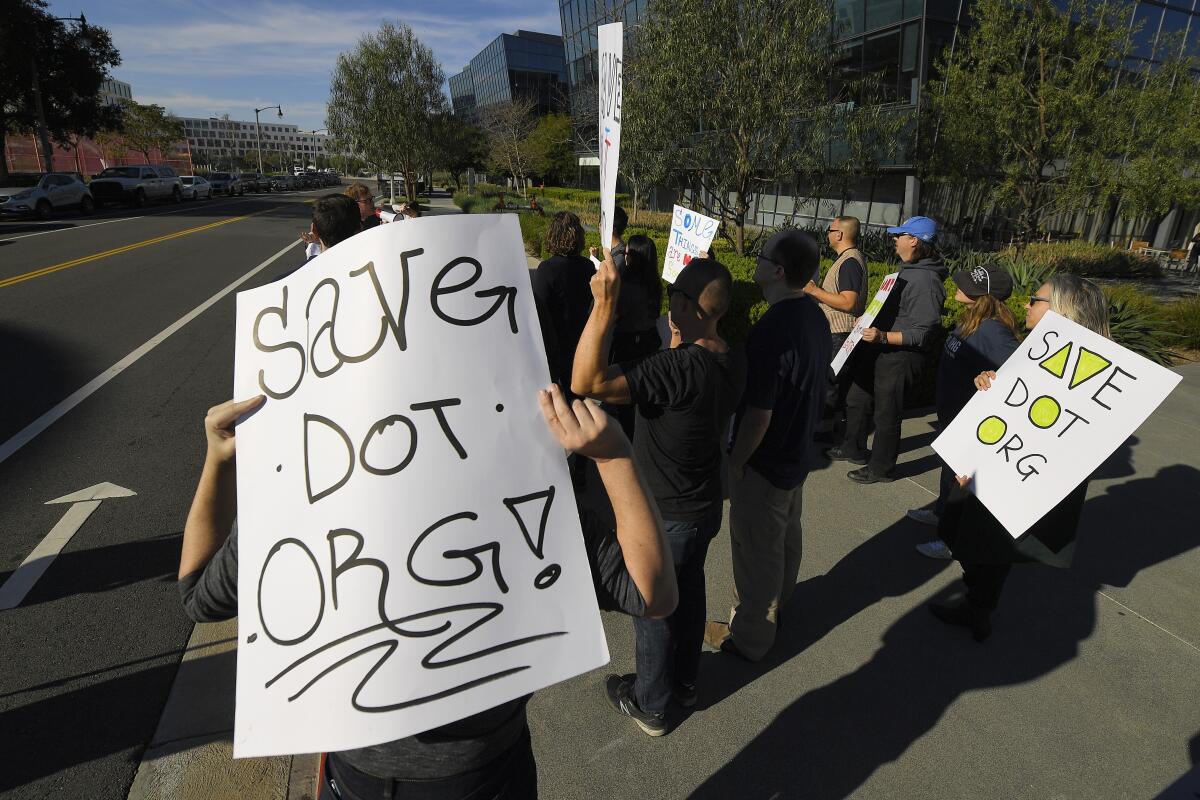Op-Ed: The sale of the dot-org registry to a private equity firm was just blocked. Here’s why it matters

- Share via
A decision announced Thursday is a rare bit of good news in these troubling times.
After months of delays while its staff worked from home, and under mounting pressure, the Los Angeles-based Internet Corporation for Assigned Names and Numbers, a nonprofit group known as ICANN that is essential to the smooth running of the internet, resoundingly blocked a plan to sell to a private equity firm control of the dot-org domain, the part of the internet where 10 million websites reside.
The $1.135-billion deal — with questionable financial backing and an unknown business plan — would have transferred control of the Public Interest Registry, which manages the dot-org domain, from the Internet Society, a nonprofit group, to an investment firm, Ethos Capital.
Why does this matter?
As the pandemic has shown, it has been left to civil society organizations, and individual volunteers, to step up and fill the gaps left by governments and corporations.
Large organizations such as Doctors Without Borders, the International Red Cross and the United Nations provide direct, immediate support to hospitals and healthcare professionals. Neighborhood and grass-roots organizations have distributed meals and provided accommodation and friendship to the sick and vulnerable.
These organizations range in size, mission, effectiveness and reach, but have two elements in common: They’re working toward the betterment of society, and their websites end in dot-org.
Privatizing resources established for the public good has a poor track record — think hospitals, prison systems, aged-care facilities, postal services — and privatizing control of the dot-org domain would have been catastrophic.
Simply put, when your bottom line is the dollar, your top priority cannot be the public good.
How did the proposed sale come about in the first place?
Last year, when the Internet Society announced its plans to sell the dot-org domain, a host of organizations — including Greenpeace International, 350.org, Human Rights Watch, Amnesty International, Electronic Frontier Foundation and my organization, Access Now — immediately recognized the immense, irreversible damage this would cause.
Around the world, people and organizations are using 10.5 million dot-org domains to host their websites, run campaigns, share educational content, collaborate on open-source development and much more. We all knew it was of critical importance that we maintain dot-org as a space insulated from private sector interests — and stewarded by people who prioritize the needs of civil society, including nonprofit groups, charities and foundations.
From downloading government health guidelines to online learning to connecting with isolated friends and family, the internet has become a lifeline. It has become the town square, the hospital and the schoolyard all at once. Now was clearly the time to protect it, not sell it off to private equity.
The pandemic has also exposed devious and wide-ranging internet manipulation and abuses. From Hungary to Algeria to Venezuela, we’ve seen targeted blocking of websites that criticize government mismanagement. Many governments have implemented new laws attaching criminal penalties to circulation of what they deem misinformation — a thin pretext for censorship. We have no evidence that a private equity firm like Ethos Capital would have stood up to protect dot-org sites from censorship if such challenges arose.
Private companies are overwhelmingly in control of how we interact online, ranging from our internet speed to the moderation of our messaging platforms. Private companies cannot stand up to governments that line their pockets through government contracts. Private companies with agendas cannot be allowed to determine content — think reproductive health, minority communities, gender. Private companies cannot be trusted to not “increase the rent” on small organizations. Private companies do not spend $1.1 billion on an internet domain unless there is profit to be made.
In fairness, Ethos did offer safeguards, including a Stewardship Council to provide oversight and a promise to keep dot-org domain names affordable.
Moreover, the Internet Society — which advocates for an open, trustworthy and secure internet — made a compelling case that it needed the sale to create an endowment that would put it on a safer financial footing.
But it was never a good idea. The Public Interest Registry, a Pennsylvania-based nonprofit overseen by the Internet Society, would have been spun off as a private company saddled with $360 million in debt.
ICANN heard the concerns of public authorities — letters from the governments of France and Germany, in addition to the California attorney general — along with comments from close to 64,000 individuals and nearly 900 organizations, including 350.org, Circus Freaks and the YMCA. The internet stood up and was heard.
In announcing its decision Thursday, ICANN wisely condemned “a change from the fundamental public interest nature of PIR to an entity that is bound to serve the interests of its corporate stakeholders, and which has no meaningful plan to protect or serve the dot-org community.”
What happens next isn’t clear. If the Internet Society no longer wants to control the dot-org domain, an alternative will need to be found. ICANN’s board has indicated it wants a mission-based, trusted, financially sustainable nonprofit to navigate the demands of dot-org registrants, governments, regulators and the operator of the domain. To find this special home, we’ll need an open process, innovative ideas and committed partners — all of which we’ve built over the last few, wild months.
Brett Solomon is the executive director of Access Now, a global organization that works to protect privacy, free expression, digital security and human rights among internet users.
More to Read
A cure for the common opinion
Get thought-provoking perspectives with our weekly newsletter.
You may occasionally receive promotional content from the Los Angeles Times.









